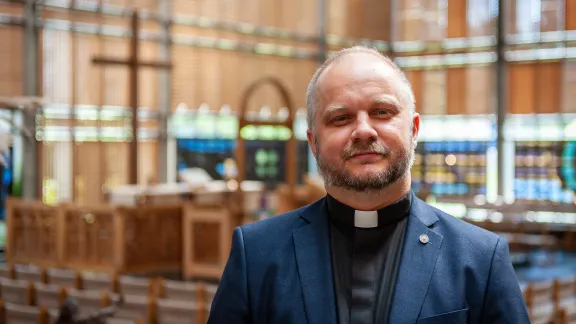Bishop Pavlo Shvarts of the German Evangelical Lutheran Church of Ukraine on “accepting one’s human limitations”

Pavlo Shvarts, Bischof der Deutschen Evangelisch-Lutherischen Kirche in der Ukraine. Foto: LWB/S. Gallay
(LWI) - With no end in sight to the Russian assault on Ukraine, the leader of the German Evangelical Lutheran Church of Ukraine, Bishop Pavlo Shvarts, has been speaking out about the fears and feelings of helplessness that pastors and people are facing, together with his own hopes for a just peace in the region. His words come as the Lutheran World Federation (LWF) Council accepted a request for individual membership of his church, making it the 149th member of the global communion of churches.
As pastor of a congregation in the north-eastern city Kharkiv, which was a major Russian target during the February invasion, Shvarts has stayed with his parishioners, leaving only to take his wife and children to safety outside the city. Most congregations continue to hold worship services, while their pastors offer whatever care and support they can to anyone in need.
Providing practical and psychological support to the pastors themselves is a priority for Bishop Shvarts, since so many Ukrainians have lost jobs and have no income at this time. At the start of the war, he organized an online meeting for ministers to share their problems, in particular the feelings of helplessness, guilt and fear they encounter. “The experience of war,” he says, “is also the experience of accepting one’s human limitations, accepting that there are things that only God can do.”
Over eight years of war
As the shelling of towns and cities in the south and east of his country continues, the bishop says it is hard to tell how many parishioners have lost homes or other properties. Apart from Kharkiv and Odessa, he says, the majority of people have not left their homes, and some who fled to safety following the intensification of Russian attacks in February have since returned to their hometowns.
But Bishop Shvarts insists that the current conflict is a simply an intensification of the war that Russia has been waging on Ukraine for more than eight years since its annexation of the Crimean peninsula. “While this annexation was completed practically without military confrontation, the next step was the occupation of Donbas which was a very bloody episode of our war in 2014-2015,” he says.
“The number of civilian and military causalities during this time is more than 10.000,” he adds, “so we can say that this war has been going on constantly.” Ukraine is the largest European country in terms of territory, he points out, yet “despite this, Russian missiles hit our entire territory and such a danger remains to this day.”
Just peace and freedom of faith
Speaking of the need for a just peace in his country, Shvarts says that “peace without freedom does not make sense from our Ukrainian perspective. We do not want to succumb to the Russian Federation just so that they stop dropping bombs on us, launching missiles or driving tanks across our territory.”
“We want to remain free, including free in our faith,” he continues, “because for us as Lutherans it is also crucial.” He says that the situation in the Donbas region has already shown that “we will be the persecuted minority in the case of occupation by the Russian Federation.”
A just peace, he insists, is one in which “things are called by their proper names: that is the victim is called the victim, the aggressor is called the aggressor, sin is called sin.” Without that it is impossible to talk about the next steps of “possible reconciliation or at least forgiveness,” he says. On the church’s website, he notes, there are eyewitness accounts of parishioners’ wartime experiences, as people share testimonies of what happened to them and how they found strength to survive.
The message of Easter is the incredible power of hope that we receive in the resurrection.
– Bishop Pavlo Shvarts of the German Evangelical Lutheran Church of Ukraine
“Preaching the Gospel brings hope that despite the circumstances, despite what is happening near us – God is always with us. He is the one who helps us, who listens to us,” Bishop Shvarts says. The message of Easter, he continues is “the incredible power of hope that we receive in the resurrection. And it seems to me that this Easter news has become special and closer for many believers in this time.”
Being part of the LWF, the bishop says, “is vital for our little Lutheran church,” reminding people that “we belong to a larger Lutheran community in which we have unity in communion and worship and a shared vision of how to help people.” He notes with gratitude the many signs and symbols of support from other Lutheran churches that offered prayers as well as financial and material support.
“With God's help, we also try to use all the aid we receive as efficiently and wisely as possible," he concludes. "Thank you, time and again, for those prayers and for the support that Lutheran churches in Europe and beyond provide to refugees from Ukraine.”


